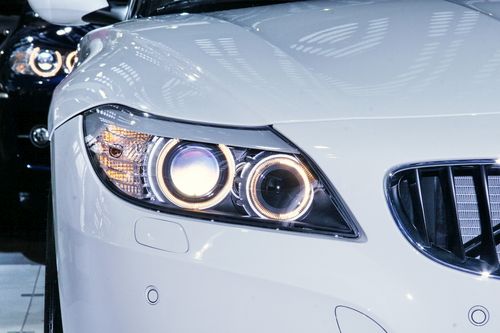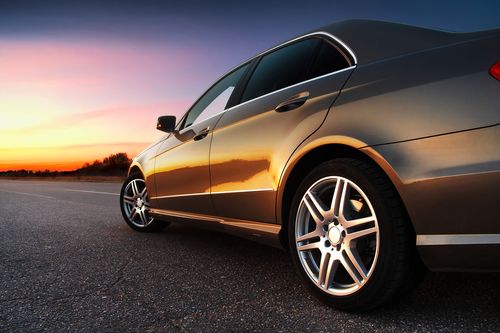BMW launches new M340i on the Indian market
BMW unveils another new variant of its 3 Series model lineup, the M340i. Sales of the sporty compact sedan began in India on March 10, 2021. The top model is a BMW 3 Series upgraded by in-house tuner M-Performance. Under the hood works a 3-liter six-cylinder engine that produces 387 hp and 500 Nm of torque. Power is transmitted via an 8-speed automatic transmission and xDrive all-wheel drive. The BMW manages the sprint from 0 to 100 km/h in just 4.4 seconds. Compared to a standard 3-series car, the M340i has received a special exhaust system, stronger brakes and sport suspension. Cosmetic changes include front and rear LED lights, chrome grille, 19-inch aluminum wheels and a revised exhaust trim. The interior is largely identical to a standard 2021 BMW 3-series, which means a 10.25-inch touchscreen, iDrive system, 3-zone automatic climate control, parking sensors and a digital dashboard in the center. The M variant differs only by various aluminum applications in the interior, which are intended to emphasize the sporty character of the vehicle.

In addition to the release of the new top model in BMW’s 3 Series, there have been other adjustments for the Indian market. These were made due to the introduction of the GT variants last month. For instance, the sole diesel 320d is now only available in the luxury trim. The gasoline 330i continues to be offered in Sport and M trim levels. Even though the Indian market remains attractive for luxury vehicles from foreign manufacturers, BMW saw a 31.5 percent drop in January over the past year. According to BMW India, the decline is due to the Covid 19 pandemic and related delivery issues. In 2020, BMW managed to sell a total of 6,604 vehicles, of which 6,092 were from the main brand and 512 from the Mini brand. Meanwhile, the BMW Motorcycles division saw a huge increase, with 2,563 two-wheelers sold last year. Most in demand were the touring models R1250 GS/GSA and F750/850 GS, which accounted for 80 percent of all sales.
Cars and two-wheelers and their components must be certified in India according to AIS guidelines. AIS stands for Automotive Industry Standards, the technical automotive standards for India. MPR International GmbH – India Certification will be pleased to assist you with AIS certification and is also available to answer any questions you may have.
AIS stands for Automotive Industry Standards, the technical automotive standards for India, while TAC stands for Type Approval Certificate. This kind of automotive product certifiation is conducted by authorities like the International Center for Automotive Technology (iCAT).
Depending on the product category, there are different certification steps. We will be happy to advise you on certification in India like AIS, BIS, WPC, TEC or PESO and are always available to answer your questions.
Please do not hesitate to contact us for further details and consultation. You can contact us via e-mail, or call us (UK: +44 2071931135, Rest of Europe: +49 69 2713769261, US: +1 773 654-2673).
If you have any questions you can also use our chat-window in the bottom right. (Please check your browser settings if you can’t see the window)
You can also check out our free AIS-Brochure, which can be downloaded right here as a PDF file.
The Indian market for smartwatches and other wearables is growing in the triple digits
Analysts at IDC, a market intelligence provider, recently released these figures in a report. For example, the market for smartwatches, wristbands, earphones and other wearable electronics, known as wearables, grew 144.3 percent year-over-year. IDC said 36.4 million devices were shipped. India was the only country in the top 20 with triple-digit growth and remains the world’s third-largest market, the report said. IDC estimates that growth was driven by the rising popularity of earbuds and consumers’ shift from traditional watches to smartwatches and wristbands. Both product segments recorded their highest shipments to date in 2020.

Jaipal Singh, IDC India associate research manager (client devices), said last year saw a major shift from wired audio devices to wireless variants. As a result, he expects the market to move toward high-end or feature-rich devices this year. In the case of smartwatches, prices have now fallen to the point where this is no longer a barrier to purchase, Singh added. The design of the new watches is also more appealing to most customers than conventional watches, and vendors will shift their offerings and portfolio accordingly in the coming months, Singh said.
The earbud product category has grown more than threefold in the past year, with 30.4 million units sold. In addition to affordable prices, increased usage outside of entertainment purposes such as video conferencing or distance learning also contributed to the growth. Particularly in demand for earphones were so-called TWS (true wireless stereo) devices, which connect to the music source via Bluetooth and the left and right audio channels produce separate, high-fidelity stereo sound on the earphones without delay. Of all wearables, audio accounted for 86.3 percent in 2020. Indian manufacturer Boat is the clear market leader with more than two-thirds of all headphones and earbuds shipped. Samsung, including its JBL, Harman Kardon and Infinity sub-brands, is in second place and had 14.5 percent market share last year.
In smartwatches, the number of units shipped exceeded 1 million for the first time in the third quarter of 2020. This compares to only 300,000 devices shipped in the same quarter last year. The most popular models of smartwatches in India were the Noise Colorfit pro-2, Realme watch, Apple watch 6 and Amazfit watches. The growing popularity of smartwatches could have an impact on wristband sales, according to IDC analysts. Their shipments fell 34.3 percent year-on-year to 3.3 million devices after peaking in 2019.
Consumer electronics devices such as smartwatches and earbuds require BIS-CRS certification to import or market them in India. MPR International GmbH – India Certification will be pleased to assist you with BIS-CRS certification and is also available to answer any questions you may have.
If you are interested in understanding what requirements are needed for your product to be imported into India, please do not hesitate to contact us by email or phone at +49-69-271 37 69 261. There is no cost or obligation for us to check for you. If a certification need is discovered we can provide a quotation to make sure that all your certification needs are covered.
If you have any questions you can also use our chat-window in the bottom right. (Please check your browser settings if you can’t see the window)
For more information about BIS certification, please refer to our free brochure “BIS Certification Made Easy“.
Car sales in India rise sharply
Due to rising consumer confidence as well as an increased need for a personal mode of transportation in light of the Covid 19 pandemic, passenger car sales in India increased dramatically in February 2021. According to published data from the Indian Society of Automobile Manufacturers (SIAM), sales of passenger cars rose 18 percent to 281,380 vehicles. The figures do not include sales by Tata Motors, as they do no longer submit monthly sales figures to the association. Sales of two-wheelers rose 10 percent to a total of 1,426,865 units, of which 464,744 were scooters and 910,323 were motorcycles. Sales of three-wheelers, on the other hand, fell 34 percent to 27,331 units.

India’s largest automaker, Maruti Suzuki India (MSI), also benefited from rising demand last year. MSI’s models ranked in the top five of the best-selling new cars in India for the fourth consecutive year; in detail, the best-sellers were the Swift, Baleno, Wagon R, Alto and Dzire. The Suzuki Swift compact car ranked first with 172,000 units, followed by the compact Baleno with 163,000. The Wagon R city car ranked third with 160,000 units, while the Alto and Dzire ranked fourth and fifth with 159,000 and 128,000 units sold, respectively. Next after MSI in terms of market share is Hyundai; Tata, Kia and Mahindra are the other top 5 manufacturers.
AIS stands for Automotive Industry Standards, the technical automotive standards for India, while TAC stands for Type Approval Certificate. This kind of automotive product certifiation is conducted by authorities like the International Center for Automotive Technology (iCAT).
Depending on the product category, there are different certification steps. We will be happy to advise you on certification in India like AIS, BIS, WPC, TEC or PESO and are always available to answer your questions.
Please do not hesitate to contact us for further details and consultation. You can contact us via e-mail, or call us (UK: +44 2071931135, Rest of Europe: +49 69 2713769261, US: +1 773 654-2673).
If you have any questions you can also use our chat-window in the bottom right. (Please check your browser settings if you can’t see the window)
You can also check out our free AIS-Brochure, which can be downloaded right here as a PDF file.
Automotive sector suppliers demand long-term planning certainty for legislative changes
In India, suppliers in the automotive sector are demanding a short-term pause in the introduction of new laws and regulations. They are also demanding long-term planning certainty in order to prepare appropriate investments. The president of the industry association ACMA, Deepak Jain, indicated that in the event of a recovery of the Indian economy, automotive suppliers will play an important role. He further said that during the transition of India’s emission standards from BS4 to BS6, the auto industry invested around $10.7 billion to implement the guidelines accordingly. It is estimated that between 40 and 50 percent of this was shouldered by suppliers. As a result, his association, ACMA, which represents India’s major automotive suppliers, is calling for a temporary suspension or postponement of further new regulations.
The financial situation is tight at many companies, leaving no scope for new investments. This is due to a general downturn in the auto industry as well as supply disruptions and production outages due to the COVID-19 pandemic. According to ACMA President Jain, supply chains are currently already overwhelmed even with the lower demand. He suggested a possible solution would be a meeting of other industry associations and the government to come up with a long-term plan. According to his information, companies are also expecting direct support and subsidies from the government during this difficult period. In the last fiscal year, the Indian supplier industry generated a turnover of 49.2 billion US dollars and reported a decrease of 11.7 percent compared to the previous year.
In addition to vehicles as a whole, an increasing number of components in the automotive sector in India must undergo certification before they can be imported or marketed. Recently, some product categories such as rims, tires, automotive glass and electronic components have been added to this mandatory certification. The relevant automotive technical standards, called Automotive Industry Standards or AIS for short, apply to India as a manufacturing location.
AIS stands for Automotive Industry Standards, the technical automotive standards for India, while TAC stands for Type Approval Certificate. This kind of automotive product certifiation is conducted by authorities like the International Center for Automotive Technology (iCAT).
Depending on the product category, there are different certification steps. We will be happy to advise you on certification in India like AIS, BIS, WPC, TEC or PESO and are always available to answer your questions.
Please do not hesitate to contact us for further details and consultation. You can contact us via e-mail, or call us (UK: +44 2071931135, Rest of Europe: +49 69 2713769261, US: +1 773 654-2673). If you have any questions you can also use our chat-window in the bottom right. (Please check your browser settings if you can’t see the window)
You can also check out our free AIS-Brochure, which can be downloaded right here as a PDF file.



